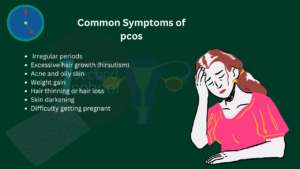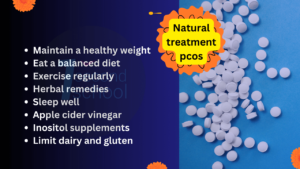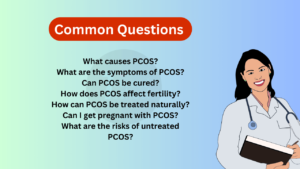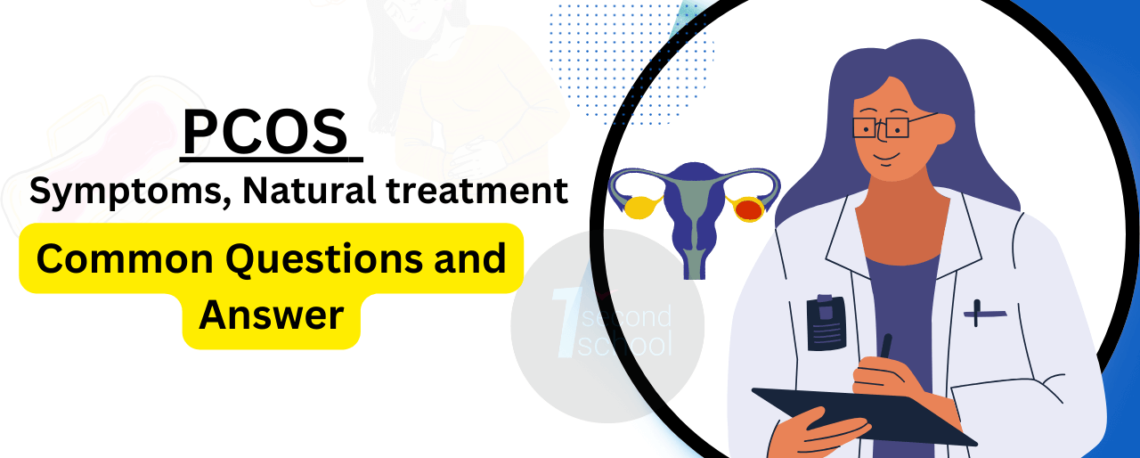PCOS Symptoms and Treatment: Polycystic ovary syndrome (PCOS) is a common hormonal disorder that affects women of reproductive age, causing a variety of symptoms and complications. Although the exact cause of PCOS is still unclear, it is linked to genetic and environmental factors. Early diagnosis and treatment can help manage symptoms and reduce the risk of complications such as infertility and diabetes. In this post, we will look at the symptoms of PCOS and discuss the right treatment options. Let’s start…
What is PCOS ?
PCOS stands for Polycystic Ovary Syndrome. It occurs when a woman’s ovaries produce abnormal amounts of androgens, the male sex hormone, which is normally present in small amounts in women. This hormonal imbalance affects the development and release of eggs during ovulation, often leading to the formation of multiple small cysts in the ovaries.
Common Symptoms of pcos – PCOS Symptoms and Treatment
Symptoms of PCOS vary from woman to woman, and they often begin during the first menstrual cycle or later in the reproductive years. Common symptoms include:
1. Irregular periods
Women with PCOS often have infrequent, prolonged, or irregular menstrual cycles. Some periods may be missed entirely or have fewer than nine periods in a year.
2. Excessive hair growth (hirsutism)
PCOS can cause excessive hair growth on the face, chest, back, and abdomen due to high levels of male hormones (androgens). This condition is called hirsutism and affects about 70% of women with PCOS.
3. Acne and oily skin
Elevated androgen levels can lead to more acne, especially on the face, chest, and upper back. This acne can be persistent and resistant to common treatments.
4. Weight gain
Many women with PCOS gain weight and struggle with obesity, especially around the abdomen. This can worsen symptoms and increase the risk of other health problems, such as insulin resistance and type 2 diabetes.
5. Hair thinning or hair loss
PCOS can cause thinning or hair loss on the scalp, often resembling male-pattern baldness. An increase in androgen levels causes it.
6. Skin darkening
Some women with PCOS experience dark spots on the skin, especially on the neck, groin, and under the breasts. This condition is called acanthosis nigricans and is often associated with insulin resistance.
7. Difficulty getting pregnant
PCOS is a leading cause of infertility. Hormonal imbalances interfere with ovulation, making it difficult to conceive. Women may feel late getting pregnant or may need fertility treatment.

Causes of PCOS
The exact cause of PCOS is still unknown, but several factors contribute to its development, including:
Genetics: PCOS tends to run in families, suggesting a genetic component.
Insulin resistance: Many women with PCOS have insulin resistance, which causes increased insulin production, which can stimulate the ovaries to produce more androgens.
Hormonal Imbalance: High levels of male hormones such as androgens disrupt normal ovulation and menstrual cycles.
Natural treatment pcos
Natural treatments for PCOS (Polycystic Ovary Syndrome) can help manage symptoms and improve overall health rather than relying solely on medication. Here are some natural treatment options for PCOS: PCOS Symptoms and Treatment
1. Maintain a healthy weight
How it helps: Losing weight, even as little as 5-10%, can help regulate the menstrual cycle, improve insulin sensitivity, and reduce symptoms of excess hair growth.
How to achieve: A balanced diet and exercise sometime every day. Avoid crash diets and aim for gradual and sustainable weight loss. Never try to lose weight quickly.
2. Eat a balanced diet
Low glycemic index (GI) foods: Eating low-GI foods can help control insulin levels. These include whole grains, legumes, nuts, seeds, and a variety of non-starchy vegetables.
Avoid refined carbohydrates: Eat as little sugar and refined carbohydrates (such as white bread, pasta, and sugary foods) as possible to stabilize blood sugar and reduce insulin resistance.
Increase fiber intake: High-fiber foods like fruits, a variety of vegetables, and whole grains can improve digestion and help control weight and blood sugar levels.
Healthy fats: Include healthy fats like omega-3 (salmon, walnuts, chia seeds, flaxseed, flaxseed oil, omega-3-rich eggs) to reduce inflammation and improve hormone balance.
3. Exercise regularly
Why it helps: Regular physical activity improves insulin sensitivity, reduces body fat, and helps regulate the menstrual cycle.
Type of exercise: Include both aerobic exercise (such as walking, cycling and swimming) and strength training, whether at the gym or at home (such as lifting weights or using resistance bands). Aim for at least 30 minutes a day, most days of the week.
4. Herbal remedies
Spearmint Tea: Studies suggest that drinking spearmint tea twice a day can reduce androgen levels, helping with symptoms like excessive hair growth and acne.
Cinnamon: Cinnamon has been shown to improve insulin sensitivity and regulate the menstrual cycle. Add it to your diet by sprinkling it into oatmeal, smoothies or tea.
Fenugreek: This herb can help regulate insulin levels and improve metabolic function in women with PCOS. You can soak fenugreek seeds overnight and eat them on an empty stomach.
Vitex (Chastberry): Vitex helps balance hormones and regulate the menstrual cycle. Consult a healthcare provider before using it, as it may interact with other medications.
5. Sleep well
Why it helps: Poor sleep can disrupt hormone balance and increase insulin resistance, which worsens PCOS symptoms.
How to improve sleep: Aim for 7-8 hours of quality sleep per night. Maintain a regular sleep schedule, create a relaxing bedtime routine, and avoid caffeine or screens before bed.
6. Apple cider vinegar
Why it helps: Apple cider vinegar can help regulate blood sugar levels and improve insulin sensitivity, which can help manage PCOS symptoms.
How to use: Mix one tablespoon of apple cider vinegar in water and drink before meals. Start small to see how your body reacts.
7. Inositol supplements
Why it helps: Inositol, a type of sugar related to B vitamins, can improve insulin sensitivity and promote ovulation. It is a natural supplement that is often recommended for women with PCOS.
Dosage: Consult a healthcare professional for appropriate dosage.
8. Limit dairy and gluten
Why it helps: Some women with PCOS may find that reducing or eliminating dairy and gluten helps reduce inflammation and improve hormonal balance.
How to adjust: Try eliminating these foods for a few weeks and observe how your body reacts.
Managing PCOS for Long-Term Health
In addition to coping with symptoms, women with PCOS should be aware of long-term health risks associated with the condition, such as:
Type 2 diabetes: Due to insulin resistance, women with PCOS are at higher risk of developing type 2 diabetes. Regular blood sugar monitoring and a healthy lifestyle must be followed.
Cardiovascular Disease: High cholesterol, high blood pressure, and other risk factors increase the chance of heart disease in women with PCOS.
Endometrial cancer: Irregular periods can thicken the lining of the uterus and increase the risk of endometrial cancer. Regular monitoring and treatment should be given to reduce this risk.

Read more post link-
Complications
Complications of PCOS can include:
- Infertility
- Gestational diabetes or high blood pressure due to pregnancy
- Miscarriage or premature birth
- Non-alcoholic steatohepatitis – due to fatty deposits in the liver
- Metabolic syndrome – a cluster of conditions including high blood pressure, high blood sugar, and unhealthy cholesterol or triglyceride levels that significantly increase your risk of heart and blood vessel (cardiovascular) disease
- Type 2 diabetes or prediabetes
- Sleep apnea
- Depression and anxiety
- Caused by cancer of the lining of the uterus (endometrial cancer)
Additional Common Questions
What causes PCOS?
Answer: The exact cause of PCOS is unknown, but it is believed to be related to hormonal imbalances, including higher levels of androgens (male hormones) and insulin resistance. Genetics and environmental factors may also play a role.
What causes PCOS?
Ans: The exact cause of PCOS is unknown, but it is thought to be related to hormonal imbalances, including high levels of androgens (male hormones) and insulin resistance. Genetics and environmental factors may also play a role.
What are the symptoms of PCOS?
Ans: Common symptoms of PCOS include irregular menstrual cycles, excess facial or body hair (hirsutism), acne, weight gain, thinning hair or scalp hair loss, and difficulty getting pregnant.
Can PCOS be cured?
Ans: PCOS cannot be completely cured, but its symptoms can be managed with lifestyle changes, medication, and treatment. Weight control, a healthy diet, regular exercise, and medications such as birth control pills or metformin can help control symptoms.
How does PCOS affect fertility?
Ans: PCOS can make conception difficult because it affects ovulation. Women with PCOS may have irregular or absent periods, which can make it difficult to predict when ovulation occurs. However, many women with PCOS can still get pregnant with the help of fertility treatments or lifestyle changes.
How can PCOS be treated naturally?
Ans: Natural treatments for PCOS include weight loss, a balanced diet low in refined carbohydrates and sugars, regular exercise, stress management, and using herbs such as inositol or spearmint tea and cinnamon. These methods can help manage symptoms and improve overall health.
Can I get pregnant with PCOS?
Ans: Yes, many women with PCOS can get pregnant, although it may take longer due to irregular ovulation. Fertility treatments such as drugs, lifestyle changes, or assisted reproductive technology such as IVF may be necessary for some women to induce ovulation.
What are the risks of untreated PCOS?
Ans: If left untreated, PCOS can lead to serious health complications such as type 2 diabetes, high blood pressure, heart disease, infertility and endometrial cancer. It can worsen mental health problems such as depression and anxiety.
Is PCOS genetic?
Yes, PCOS has a genetic component. If a mother or sister has PCOS, the risk is higher.
What hormones affect PCOS?
PCOS is mainly affected by the following hormones:
Androgens: High levels of male hormones, such as testosterone, can cause excess hair growth and acne.
Insulin: Insulin resistance can increase insulin levels, contributing to weight gain and high androgen levels.

More Read:
Menopause – What it is, symptoms and treatment in detail
Acne – What to do, symptoms and proper treatment
Thyroid Test – Patient Diet and Treatment
Key points about PCOS
- PCOS is a very common hormonal problem for women of childbearing age. Which happens more or less to everyone.
- Women with PCOS may not ovulate, have high levels of androgens, and may have very small cysts on the ovaries.
- PCOS can cause missed or irregular periods, excess hair growth, acne, infertility and weight gain.
- Women with PCOS may have a higher risk of type 2 diabetes, high blood pressure, heart problems, and endometrial cancer.
- Treatment options for PCOS may depend on whether a woman is planning to become pregnant. Women who are planning to get pregnant in the future can take different types of medicines as per doctor’s advice.
Conclusion
PCOS Symptoms and Treatment In conclusion, polycystic ovary syndrome (PCOS) is a common hormonal disorder that affects many women. It can cause symptoms like irregular periods, excessive hair growth, and fertility problems. Early diagnosis and lifestyle changes, such as a balanced diet and regular exercise, can help manage symptoms and reduce the risk of related health problems. With proper care and support from healthcare professionals, women with PCOS can lead healthy, fulfilling lives.
